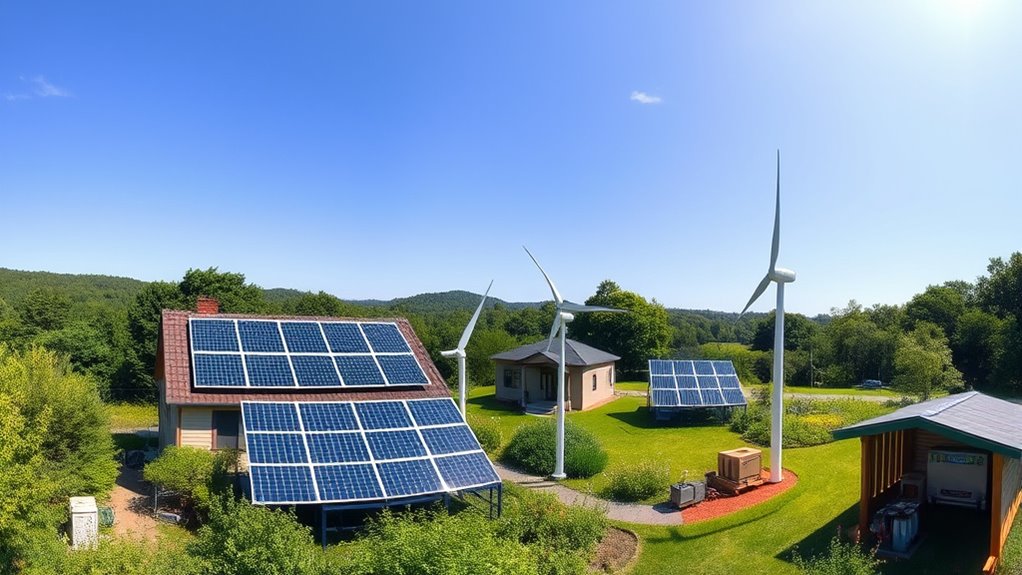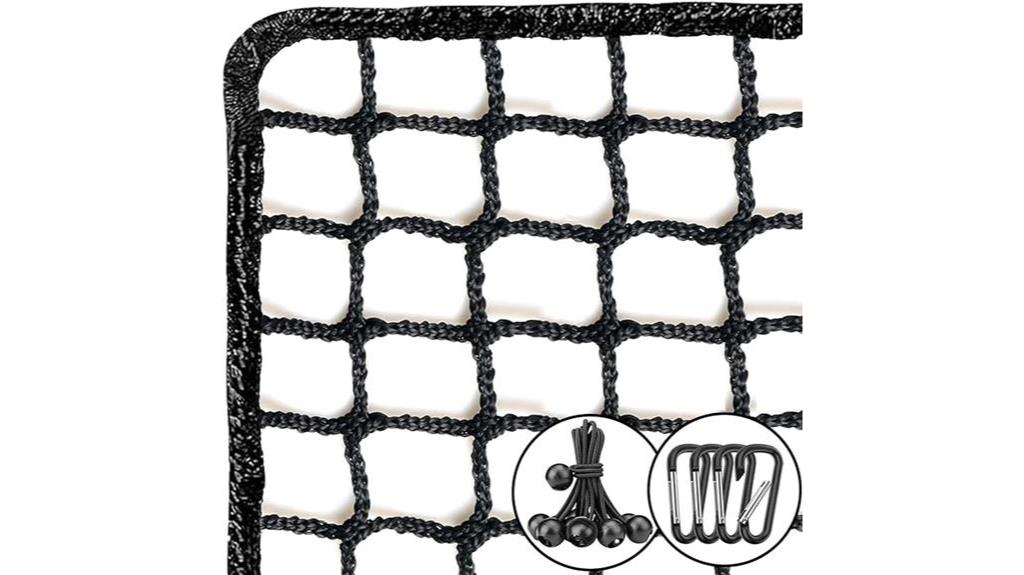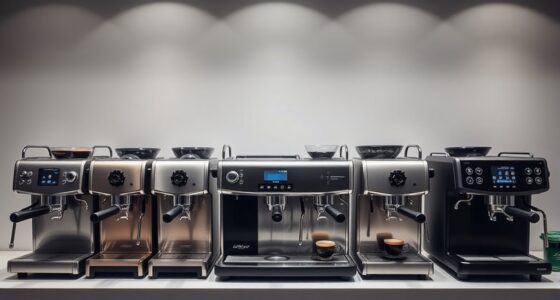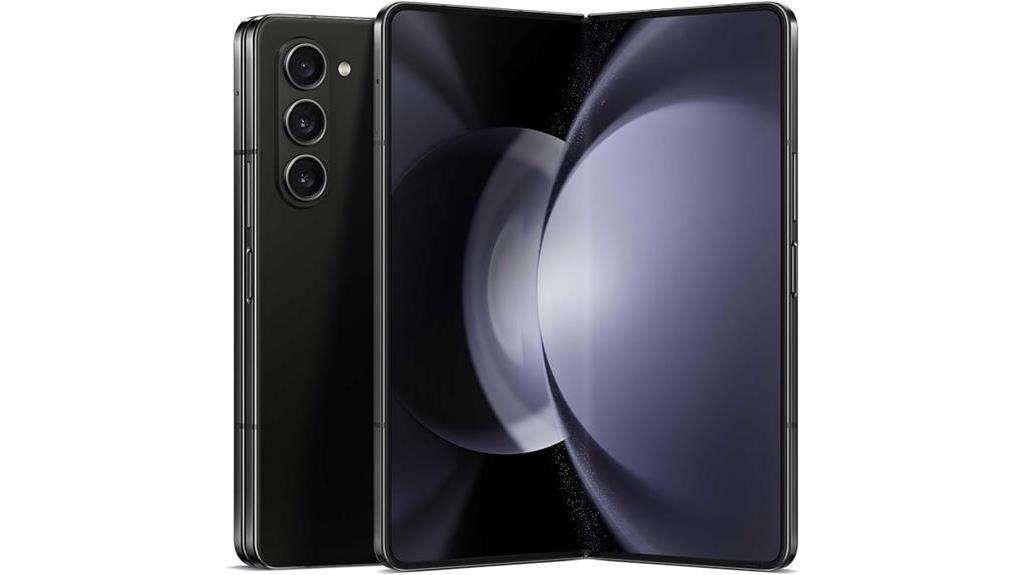If you’re looking for reliable off-grid power solutions for self-sufficient living, I recommend exploring a mix of portable power stations and large-scale solar systems. Portable units like the DaranEner NEO600 or Purea Power Station offer flexibility and backup power for emergencies or outdoor activities. For whole-home independence, scalable systems such as ECO-WORTHY’s 10KW or 30KWh setups provide long-lasting energy and expansion options. Keep these options in mind, and you’ll discover more ways to energize your off-grid lifestyle.
Key Takeaways
- Consider scalable solar systems like ECO-WORTHY 10KW or 30KWh setups for future expansion and reliable off-grid power.
- Evaluate portable power stations such as DaranEner NEO600 or Purea for emergency backup and outdoor use.
- Choose high-capacity home solar kits with durable panels and long warranties for consistent daily energy production.
- Opt for advanced systems with smart monitoring, high cycle life batteries, and efficient inverters for long-term dependability.
- Assess system compatibility, installation complexity, and support services to ensure a seamless transition to self-sufficient off-grid living.
Portable Power Station 600W (1200W Surge) with Solar Generator and Fast Charging
If you’re looking for a reliable off-grid power solution, the DaranEner NEO600 Portable Power Station is an excellent choice, especially for camping, emergency backup, or RV trips. It offers 576Wh capacity, with a continuous 600W output and a surge of 1200W, supporting multiple devices via USB-C, USB-A, DC, and cigarette lighter ports. Weighing just 6.6 pounds, it’s portable and built with durable LiFePO4 batteries that last over 10 years and 3,500 charge cycles. Fast-charging in just an hour and seamless solar compatibility make it versatile. Plus, its UPS function protects sensitive electronics, ensuring reliable power whenever you need it.
Best For: outdoor enthusiasts, emergency preparedness, and RV travelers seeking a portable, durable, and fast-charging power solution for off-grid or backup use.
Pros:
- Fast 1-hour recharge via standard AC outlet, ensuring quick turnaround times.
- Long-lasting LiFePO4 batteries with over 3,500 charge cycles and 10+ years lifespan.
- Multiple charging and output options (USB-C, USB-A, DC, cigarette lighter) for versatile device compatibility.
Cons:
- Connectors and cables are not UL-listed, limiting their use to semi-permanent or off-grid setups.
- Stiff cables may be less flexible for certain installation configurations.
- Maximum continuous output of 600W may not support high-power appliances.
Purea Portable Power Station with 1536Wh LiFePO4 Battery
The Purea Portable Power Station stands out as an ideal choice for outdoor enthusiasts and emergency preparedness, thanks to its 1536Wh LiFePO4 battery that provides reliable, long-lasting power. Weighing just 35.16 lbs, it’s 18% lighter than similar units, with a built-in handle for easy portability. It delivers up to 1800W continuous power, with multiple outlets including AC, USB-C, USB-A, and car ports. Fast charging via AC, solar, or hybrid methods recharges the battery in around 1.4 hours. Built with EV-grade cells and a smart BMS, it offers a safe, durable, and efficient off-grid power solution for home backup, camping, or RV use.
Best For: outdoor enthusiasts, emergency preparedness, and off-grid living who need reliable, portable power with fast recharge times and long-lasting battery life.
Pros:
- Lightweight design at 35.16 lbs with a built-in handle for easy portability
- Rapid hybrid charging capability recharges the battery in about 1.4 hours
- Long lifespan with EV-grade LiFePO4 cells maintaining 80% capacity after 3,000 cycles
Cons:
- Still relatively heavy for some users despite being lighter than similar units
- Limited to 600W solar input, which may not support larger off-grid setups
- Price may be higher compared to less advanced portable power stations
ECO-WORTHY 10KW Off-Grid Solar Power System with Lithium Battery and Solar Panels
The ECO-WORTHY 10KW Off-Grid Solar Power System is an excellent choice for those seeking a reliable, scalable solution to power remote or independence-focused properties. It features a 10KW hybrid inverter supporting single-phase and split-phase output, with an impressive 20KW peak power. The system includes 12 durable 410W monocrystalline solar panels and three 48V lithium iron phosphate batteries, totaling 15.36kWh of storage. Designed for easy expansion, it supports up to 11,000W of solar input and additional batteries. With plug-and-play installation, high efficiency, and a 25-year warranty on panels, it offers a dependable, future-proof off-grid energy solution.
Best For: those seeking a reliable, scalable off-grid solar energy system for remote homes, cabins, or eco-friendly properties requiring high capacity and future expandability.
Pros:
- High efficiency inverter supporting seamless power conversion and flexible configurations
- Durable, high-capacity monocrystalline solar panels with a 25-year workmanship warranty
- Easy plug-and-play installation with support for future expansion of solar input and battery storage
Cons:
- Large solar panels are shipped on pallets, which may increase shipping and handling costs
- Approximate system price around $6,600, which may be higher than basic setups for some users
- Return costs for large components can be significant unless quality issues are present
ECO-WORTHY 1200W 24V Lithium Battery Solar System Off-Grid
Designed for off-grid living, the ECO-WORTHY 1200W 24V Lithium Battery Solar System delivers reliable power for RVs, cabins, and remote homes. It generates about 5.52 kWh daily in under 4 hours of sunlight, powering everything from TVs to refrigerators. The system features six efficient bifacial panels, dual lithium batteries with high capacity, and a 3000W pure sine wave inverter for stable AC output. With Bluetooth monitoring and a modular design, setup is straightforward. It’s perfect for those seeking dependable energy, even in cloudy conditions, and can be expanded with additional tracking systems to boost power production.
Best For: individuals or families seeking reliable off-grid power solutions for RVs, cabins, or remote homes with easy setup and expandable capacity.
Pros:
- High efficiency bifacial solar panels with 33% more energy output than traditional panels
- Robust lithium battery system with deep cycle capability and built-in BMS for safety
- User-friendly modular design with Bluetooth monitoring and potential for system expansion
Cons:
- Incomplete installation instructions may require additional research or tutorials
- Some users have reported transit damage to components such as charge controllers and panels
- Additional accessories like breakers and wiring are recommended for optimal protection and may add to setup complexity
ECO-WORTHY 10.7KWH 2400W 48V Solar Power System Kit
If you need a reliable off-grid power solution capable of running major appliances, the ECO-WORTHY 10.7KWH 2400W 48V Solar Power System Kit is an excellent choice. It delivers up to 10.7 kWh daily with just four hours of sunlight, powering essentials like refrigerators, TVs, and air conditioners. The kit includes 12 bifacial solar panels with 23% efficiency, a 5000W hybrid inverter, and accessories for straightforward installation. Built to withstand harsh weather, it’s durable and expandable. With high efficiency, reliable performance, and positive customer reviews, this system offers a dependable, self-sufficient energy solution for homes, cabins, or farms.
Best For: homeowners, cabin dwellers, or farms seeking a reliable, expandable off-grid solar power system capable of powering major appliances with ease.
Pros:
- High efficiency bifacial panels with 23% transmittance maximize electricity generation and space savings.
- Supports powering a wide range of appliances, including AC units, refrigerators, and TVs, suitable for various off-grid needs.
- Durable construction with weather-resistant features ensures reliable operation in harsh conditions and easy expansion options.
Cons:
- Installation may require some technical knowledge, though generally manageable for DIY enthusiasts.
- The inverter, while powerful, might need upgrading for higher capacity or specific power needs.
- The initial investment can be relatively high, though offset by long-term savings and reliability.
ExpertPower 48V Solar Power System Kit with 20KWh Battery
For those seeking a reliable off-grid power solution, the ExpertPower 48V Solar Power System Kit with 20KWh Battery stands out with its robust capacity and flexible configurations. It includes four 48V 100Ah LiFePO4 batteries, twelve 540W monocrystalline panels, and two 6500W hybrid inverters supporting up to 12 kW total power. Designed for various setups, from single-phase to 3-phase systems, it offers high efficiency and easy remote monitoring via WiFi. The advanced batteries feature a long lifespan and built-in protection, ensuring durability. While installation requires expertise, users praise its performance, making it a solid choice for powering homes or cabins off-grid.
Best For: homeowners, cabins, or off-grid enthusiasts seeking a reliable, scalable solar power system with long-lasting batteries and flexible configurations.
Pros:
- High-capacity 20KWh battery and 12kW total power output support a wide range of applications.
- Advanced LiFePO4 batteries with long lifespan and built-in protection for durability and safety.
- Remote monitoring via WiFi and scalable inverter options make system management convenient and adaptable.
Cons:
- Installation requires professional expertise to ensure safety and compliance with electrical standards.
- Some users report delays and issues with inverter defects and warranty claims.
- Heavy batteries and system components may pose challenges for DIY installation or transport.
2400W Portable Power Station with 1500Wh Battery Backup
The 2400W Portable Power Station with a 1500Wh battery backup is an excellent choice for anyone needing reliable off-grid power that can support multiple devices simultaneously. It offers four AC outlets, USB-C, USB-A, and a 12V car socket, powering over ten devices at once. Its lithium-ion battery provides over 2,000 charge cycles, ensuring durability for more than a decade. Rapid charging via mains takes just 1.5 hours, and solar charging is efficient, fully replenishing in 2-3 hours. Lightweight at 32 pounds, it’s perfect for home backup, camping, or travel, backed by a 10-year warranty for peace of mind.
Best For: outdoor enthusiasts, homeowners seeking reliable backup power, and travelers needing portable energy solutions for multiple devices.
Pros:
- Supports over 10 devices simultaneously with multiple outlets and ports
- Rapid charging in 1.5 hours via mains and efficient solar recharge in 2-3 hours
- Durable lithium-ion battery with over 2,000 charge cycles and a 10-year warranty
Cons:
- Weighs 32 pounds, which may be heavy for some users to carry over long distances
- Higher upfront cost compared to smaller or less powerful portable chargers
- Limited to 1500W solar input, which may affect recharge speed in low sunlight conditions
ExpertPower 30KWH 48V Solar Power System Kit
The ExpertPower 30KWH 48V Solar Power System Kit is an excellent choice for those seeking a reliable off-grid energy solution, especially in remote locations or during power outages. It features six 48V 100Ah LiFePO4 batteries with a 10-year lifespan and advanced BMS protection. The system includes fourteen 540W monocrystalline solar panels with 91% efficiency, two 10KW hybrid inverters, and two 100A MPPT charge controllers. Supporting off-grid, grid-tie, or hybrid setups, it delivers up to 7,560W of power with 91% efficiency. Built to endure harsh environments (IP65 rated), it offers safety features, Bluetooth monitoring, and compliance with safety standards, making it versatile and dependable.
Best For: homeowners, remote cabin dwellers, and emergency preparedness enthusiasts seeking a reliable off-grid or hybrid solar energy solution.
Pros:
- High-capacity 30KWH system with six 48V 100Ah LiFePO4 batteries offering a 10-year lifespan
- Supports versatile installation options including off-grid, grid-tie, and hybrid setups with a combined power output of 7,560W
- Durable IP65 rating and compliance with safety standards ensure reliable operation in harsh environments
Cons:
- Wiring cables, fuses, breakers, and connectors are not included, potentially increasing setup complexity and costs
- The system’s price may be relatively high compared to smaller or less feature-rich alternatives
- Requires technical knowledge for installation and optimal system integration
ECO-WORTHY 10,000W Off-Grid Solar Panel Kit for Home
If you’re looking to power your home independently with reliable, high-capacity solar energy, the ECO-WORTHY 10,000W Off-Grid Solar Panel Kit is an excellent choice. It features 24 monocrystalline panels, each 410W, providing a total of nearly 10kW, capable of generating about 40 kWh daily under ideal sunlight. The system includes two 5,000W hybrid inverters, four 48V 100Ah LiFePO4 batteries, and supports off-grid and grid-tied operation. Built with weather-resistant materials, it withstands heavy wind and snow loads. This complete kit is designed for durability, efficiency, and flexibility, making it ideal for reliable, self-sufficient energy independence.
Best For: homeowners seeking a reliable, high-capacity off-grid solar energy system for complete energy independence and backup power.
Pros:
- High total power output of nearly 10kW with 24 monocrystalline panels, suitable for large energy needs.
- Supports both off-grid and grid-tied operations with included hybrid inverters and grid charging.
- Durable weather-resistant design with a 25-year craftsmanship warranty, ideal for various climatic conditions.
Cons:
- Large, heavy panels packaged on pallets may incur high shipping costs and require significant space for installation.
- The system’s complexity may necessitate professional installation and maintenance.
- Limited detailed information on the long-term performance and battery lifespan beyond the 10.48kWh capacity.
ECO-WORTHY 400W 12V Solar Panel Kit
Designed for off-grid applications, the ECO-WORTHY 400W 12V Solar Panel Kit offers an all-encompassing solution for those looking to generate reliable solar power in remote or backup settings. It includes four 100W monocrystalline panels, a 40A MPPT charge controller with Bluetooth, mounting brackets, cables, and connectors. The durable panels feature waterproof junction boxes, low-iron glass, and robust framing, supporting high wind and snow loads. With an efficient MPPT system, it produces around 1.6 kWh daily, even on cloudy days. Installation is straightforward, aided by pre-drilled panels and plug-and-play connectors. It’s an excellent choice for powering appliances during outages or off-grid living.
Best For: off-grid homeowners, RV travelers, and boat owners seeking a reliable, all-in-one solar power solution for backup and remote energy needs.
Pros:
- High efficiency MPPT charge controller with Bluetooth monitoring for easy system management.
- Durable panels with waterproof junction boxes and strong resistance to wind and snow loads.
- Simple installation with pre-drilled panels, quick-connect connectors, and detailed instructions.
Cons:
- Some users have experienced defective controllers or cable issues requiring replacements.
- Power output can vary depending on sunlight, potentially affecting consistent performance.
- The system’s expandability may be limited by wiring configurations and available space.
ECO-WORTHY 4680W Off Grid Solar System Kit with 15KWH LiFePO4 Battery
For those seeking reliable off-grid power, the ECO-WORTHY 4680W Solar System Kit stands out with its substantial 15KWh LiFePO4 battery capacity and high-efficiency hybrid inverter. It generates around 21.5KWh daily in just four hours of sunlight, powering appliances like refrigerators, TVs, and small AC units. The system includes 24 bifacial panels with 23% efficiency, stainless steel frames, and easy mounting features. With a 5000W inverter supporting off-grid and grid-tied charging, plus remote monitoring, it offers a durable, flexible solution. While straightforward to install for experienced users, support can vary, but overall, it’s a solid choice for self-sufficient living.
Best For: homeowners, remote dwellers, or off-grid enthusiasts seeking a reliable, self-sufficient power solution for daily household needs and backup energy.
Pros:
- High daily power generation of 21.5KWh with efficient bifacial panels and hybrid inverter.
- Large 15KWh LiFePO4 battery capacity with over 4,000 cycles ensures long-term durability and safety.
- Easy-to-mount panels with corrosion-resistant frames and remote monitoring capabilities for convenient management.
Cons:
- Installation may require technical expertise; some users find setup challenging without guidance.
- Customer support and documentation can be inconsistent, leading to potential difficulties with troubleshooting.
- Cost and payback period can be lengthy depending on electricity rates and usage, affecting overall affordability.
OUKITEL P2001 Plus Solar Generator with 200W Solar Panel
The OUKITEL P2001 Plus Solar Generator with its impressive 2400W output and 2048Wh capacity stands out as an ideal power solution for those who need reliable off-grid energy. It’s portable, weighing just over 22 kg, yet capable of powering multiple devices like laptops, microwaves, and power tools through its four AC outlets and USB ports. Equipped with high-quality LiFePO4 batteries, it offers over 3,500 charge cycles, ensuring long-term durability. Fast charging in 1.5 hours, combined solar and AC input, and app control make it versatile and user-friendly. Perfect for backup power, camping, or RV use, it delivers dependable energy wherever you go.
Best For: outdoor enthusiasts, emergency preparedness households, and off-grid users seeking reliable, high-capacity portable power.
Pros:
- High 2400W continuous power output with 2048Wh capacity for multiple devices
- Long-lasting LiFePO4 batteries with over 3,500 charge cycles for durability
- Fast charging capabilities (80% in 1 hour) and versatile input options including solar and AC
Cons:
- Heavier weight (over 22 kg), which may affect portability for some users
- Higher initial cost compared to smaller or less powerful units
- Reports of high EMF emissions during operation, which could be a concern for sensitive users
ECO-WORTHY 48V 280Ah Lithium Battery (4 Packs) with Bluetooth
If you’re seeking a reliable, high-capacity battery system for off-grid applications, the ECO-WORTHY 48V 280Ah Lithium Battery with Bluetooth stands out. It offers 14.34 kWh of energy across four modules, ideal for RVs, solar setups, or home backup. The Bluetooth app lets me monitor voltage, current, and capacity in real time within 15 meters. Built-in smart BMS provides essential protections, and the durable metal frame ensures long-term stability. With over 6,000 deep cycles, this system is designed for longevity and consistent performance, making it a solid choice for those aiming for dependable, self-sufficient energy.
Best For: RV owners, off-grid solar users, and home backup system enthusiasts seeking a high-capacity, durable, and easily monitorable lithium battery solution.
Pros:
- High capacity with over 6,000 deep cycles for long-term reliability
- Bluetooth APP monitoring allows real-time data tracking within 15 meters
- Built-in smart BMS with multiple protections enhances safety and stability
Cons:
- Some units may arrive with unlabeled batteries or packaging damage, requiring verification
- Proper system configuration is essential to prevent power fluctuations and inverter issues
- Shipping may involve multiple packages, which can delay overall setup or delivery
ECO-Worthy 1.6KWH Complete Solar Panel Kit (400W, 12V)
The ECO-Worthy 1.6KWH Complete Solar Panel Kit is an excellent choice for those seeking a reliable off-grid power solution, especially when maximizing energy production is a priority. It includes four 100W bifacial panels with 23% efficiency, a 40A MPPT controller, a 2000W pure sine wave inverter, and two 12V 100Ah lithium batteries with BMS. Designed to generate up to 1.6KWH daily under ideal sunlight, it can power appliances like TVs, refrigerators, and air conditioners. The system is modular and scalable, with optional upgrades such as dual-axis trackers, making it ideal for RVs, cabins, or sheds seeking dependable renewable energy.
Best For: individuals or small-scale users seeking a reliable, scalable off-grid solar power system for RVs, cabins, sheds, or backup energy needs.
Pros:
- High efficiency bifacial panels with 23% conversion rate maximize energy production.
- Modular design allows for easy expansion and component upgrades.
- Includes essential components like MPPT controller, pure sine wave inverter, and lithium batteries for reliable performance.
Cons:
- Manual instructions can be poorly written, making installation challenging for some users.
- Occasional reports of component failures such as panels or batteries within months.
- Limited technical support and potential quality inconsistencies between components.
Vtoman 2376Wh Portable Power Station Bundle with Extra Battery & 200W Solar Panel
For anyone seeking a reliable off-grid power solution, the Vtoman 2376Wh Portable Power Station Bundle stands out thanks to its expandable capacity and versatile charging options. I appreciate how it starts with 1548Wh but can grow to 2376Wh with the extra battery, ensuring longer power availability. It supports up to 1500W output, perfect for running laptops, small appliances, or even electric grills. The included 200W solar panel charges efficiently in about 9 hours, making it ideal for outdoor adventures. Weighing just over 38 pounds, it’s portable enough for camping, RV trips, or emergency backup, providing peace of mind wherever I go.
Best For: outdoor enthusiasts, RV travelers, and emergency preparedness individuals seeking a reliable, expandable portable power solution with versatile charging options.
Pros:
- Expandable capacity from 1548Wh to 2376Wh with an extra battery for longer power supply
- Supports high-wattage devices up to 1500W, suitable for appliances and electronics
- Portable design weighing just over 38 pounds with multiple charging options including solar, AC, and car input
Cons:
- Solar panel is relatively heavy and large, which may affect portability
- Some users experience system shutdowns at 50% battery, indicating potential performance issues
- Limited refund options for used products and possible challenges with warranty claims
Factors to Consider When Choosing Off-Grid Power Systems for Home
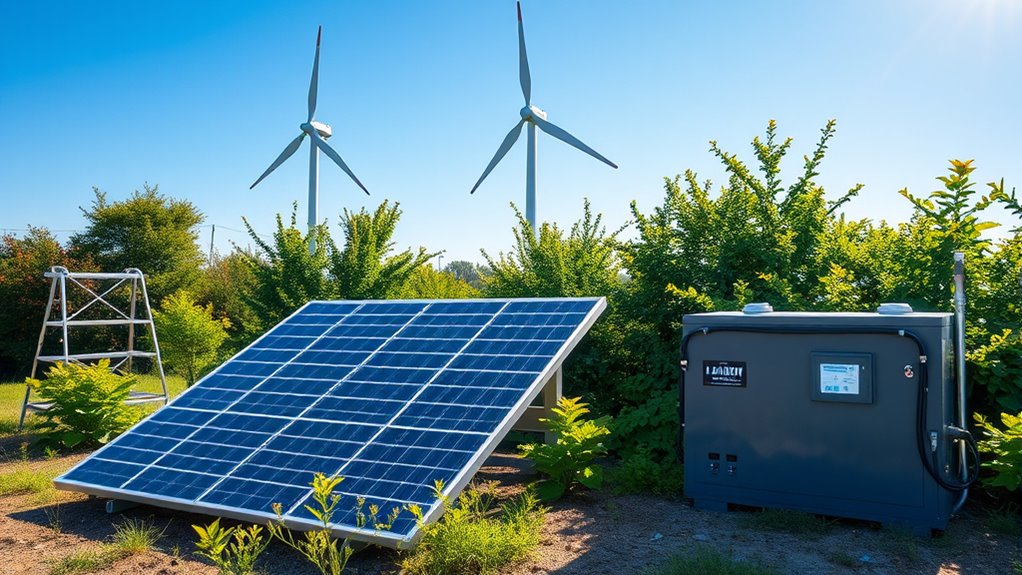
When selecting an off-grid power system for my home, I consider how much power I need daily and how long the batteries will last. I also look at whether the system can expand as my energy needs grow and if it’s compatible with existing equipment. Finally, I check the available ports and their types to verify I can connect all my devices easily.
Power Capacity Needs
Understanding your power capacity needs is essential to selecting an off-grid system that reliably meets your household’s energy demands. I start by listing all appliances and devices to determine my total daily energy consumption in kilowatt-hours (kWh). Then, I calculate each device’s wattage and estimate how long they’ll run to guarantee the system can support essential loads during outages or off-grid periods. It’s also important to take into account both continuous power output and surge capacity, especially for appliances like refrigerators and power tools that have short-term power spikes. I check if the battery capacity, measured in watt-hours (Wh), can sustain my energy needs for the desired duration without frequent recharging. Ultimately, I choose a scalable system to accommodate future expansion as my energy demands grow.
Battery Longevity & Life
Choosing the right batteries for your off-grid system hinges on understanding their longevity and how long they’ll reliably serve your needs. Battery lifespan is usually measured in charge cycles, with LiFePO4 batteries delivering over 3,000 to 7,000 cycles—far surpassing traditional lead-acid options. The depth of discharge impacts lifespan; shallow discharges help preserve capacity and extend battery life. Proper thermal management and advanced Battery Management Systems (BMS) prevent overheating, overcharging, and excessive discharges, further prolonging their service. Regular maintenance, like avoiding full discharges and staying within recommended voltage ranges, also makes a big difference. Thanks to their chemical stability and safety features, LiFePO4 batteries can retain 70-80% of capacity after thousands of cycles, ensuring long-term, reliable off-grid energy storage.
Expandability Options
Selecting an off-grid power system with expandability in mind guarantees you can grow your capacity as your needs evolve. It’s crucial to check if the system supports adding extra batteries or solar panels seamlessly, allowing future upgrades without major overhauls. Verify that the inverter and charge controllers are compatible with additional components to ensure smooth integration. Consider the system’s maximum capacity for batteries and panels—knowing these limits helps prevent overloading and keeps performance efficient. Additionally, standardized wiring, connectors, and communication protocols make expanding your setup straightforward. Always review the manufacturer’s guidelines on expansion limits and recommended configurations; this helps you avoid potential issues and ensures your system remains reliable and scalable over time.
System Compatibility
When evaluating off-grid power systems for your home, guaranteeing compatibility with your existing electrical setup is essential. First, check that the system’s voltage and current ratings match your home’s requirements to prevent overloads or inefficiencies. Make sure the system supports standard plug types and outlet configurations used in your region to avoid connection issues. It’s also important to verify that the battery chemistry, like LiFePO4, aligns with your current or planned energy storage infrastructure for safety and durability. Additionally, confirm the inverter’s capacity supports your maximum load, including surge power for appliances. Finally, guarantee the system’s communication interfaces, such as Bluetooth or WiFi, are compatible with your monitoring devices and smart home systems for seamless management.
Port Selection & Ports
To guarantee your off-grid power system meets your daily needs, it’s essential to pay close attention to the ports it offers. Make sure it has a variety of ports, like AC outlets, USB-C, USB-A, DC, and cigarette lighter sockets, to support all your devices. Check the total power output to ensure it can handle your essential appliances simultaneously without overload. Look for ports with fast-charging capabilities, such as USB-C PD 100W, to quickly power up smartphones and laptops. Consider the placement and accessibility of these ports for easy connection and disconnection during setup and everyday use. Ultimately, verify that the ports are compatible with your devices’ power requirements and that the system’s surge capacity can handle high-demand scenarios without damage.
Charging Flexibility
The way a home off-grid power system charges can make a big difference in maintaining continuous power. Supporting multiple charging methods—solar, AC, and DC—ensures you stay powered in various scenarios, even when sunlight is limited. Fast recharge capabilities, ideally under 2 hours via AC or solar, help minimize downtime and keep your system ready. Compatibility with solar panels through MC4 or parallel connectors offers flexibility for expansion and efficient renewable energy use. The system’s charging input wattage, such as 600W or higher, determines how quickly batteries refill during cloudy days. Plus, supporting simultaneous device charging and system recharging boosts versatility, allowing you to power essential devices while replenishing your batteries. Overall, flexible charging options are key to a reliable, self-sufficient off-grid setup.
Installation Complexity
Choosing the right off-grid power system for your home depends heavily on installation complexity, which varies based on the system’s size and features. Some systems are straightforward, with plug-and-play components and step-by-step instructions that make DIY installation feasible. These are ideal if you want to avoid hiring professionals and prefer a simpler setup. However, larger or more advanced systems, especially those supporting grid-tie or multi-phase configurations, involve intricate wiring, grounding, and safety protocols, making installation more challenging. Properly installing solar panels, batteries, inverters, and controllers is critical for safety, performance, and compliance with electrical codes. Manufacturers that offer extensive manuals, online tutorials, and customer support can greatly ease the process, whether you’re a DIY enthusiast or hiring a professional.
Budget & Cost
Budget and cost are essential factors when selecting an off-grid power system for your home, as they directly impact what options are feasible. The price can vary widely—from a few hundred dollars for small portable units to over $20,000 for all-inclusive solar and battery setups. Your budget often influences system capacity; larger, higher-wattage systems tend to cost more. While investing in quality batteries like LiFePO4 might have a higher upfront expense, they last longer and perform better, saving money over time. Remember, additional costs such as installation, wiring, permits, and maintenance must be included in your total budget. Comparing initial investment with potential savings on utility bills and reliability helps you choose a system that balances affordability with long-term value.
Frequently Asked Questions
How Do Off-Grid Systems Handle Extended Cloudy or Rainy Periods?
When facing extended cloudy or rainy periods, I rely on a combination of energy storage and alternative power sources. Batteries store excess energy generated during sunny days, providing power when sunlight’s scarce. I also incorporate backup generators or wind turbines as supplementary options. This layered approach guarantees I stay self-sufficient, even during prolonged bad weather, giving me peace of mind knowing I can maintain my off-grid lifestyle regardless of weather conditions.
What Are the Maintenance Requirements for Lithium-Based Off-Grid Batteries?
You’re asking about maintenance for lithium-based off-grid batteries. I find they require minimal upkeep compared to traditional batteries. I regularly check for corrosion, keep terminals clean, and guarantee they’re kept at ideal temperatures. It’s also important to monitor the state of charge and prevent over-discharging. Overall, with proper care and periodic inspections, lithium batteries stay reliable and efficient for years, making them a smart choice for off-grid living.
Can These Systems Be Expanded for Future Energy Needs?
I’ve found that most off-grid power systems, especially those with lithium batteries, are quite expandable. I’ve researched that adding more batteries or panels is usually straightforward, allowing you to scale up as your energy needs grow. Of course, I recommend working with a professional to guarantee your system’s capacity and safety are maintained. With proper planning, you can definitely future-proof your setup for increased energy demands.
How Do Off-Grid Power Systems Integrate With Existing Home Wiring?
You’re wondering how off-grid power systems connect to existing home wiring. I’d tell you that integration usually involves installing an inverter and a transfer switch. The inverter converts DC from solar panels or batteries into AC, which your home uses. The transfer switch ensures seamless switching between grid power and your off-grid system, making it safe and efficient. Proper setup is key, so I recommend consulting a professional for best results.
Are There Government Incentives or Rebates Available for Off-Grid Installations?
You’re wondering if government incentives or rebates exist for off-grid setups? I’ve found that many local, state, and federal programs offer financial incentives to promote renewable energy and self-sufficiency. These can include tax credits, grants, or rebates that markedly reduce installation costs. I recommend checking with your state’s energy department or the Database of State Incentives for Renewables & Efficiency (DSIRE). Taking advantage of these programs can make your off-grid shift more affordable and rewarding.
Conclusion
So, after all this talk about reliable off-grid power, you’d think we’d have it all figured out, right? Turns out, choosing the perfect system is a bit like finding a needle in a haystack—except the haystack is full of solar panels and batteries. But don’t worry, with a little patience and some smart choices, you’ll be powering your off-grid dream sooner than you think. Who knew self-sufficiency could be so surprisingly doable?

